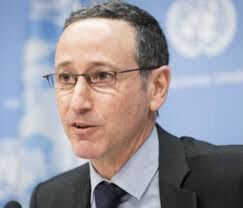Urban Resilience
Special Sessions Venue: Room 15-Demetrio Aguilera Theater- United Nations Office for Disaster Risk Reduction (UNISDR),
- United Nations Environment Programme (UN Environment),
- United Nations Human Settlements Programme (UN-Habitat).
- World Meteorological Organization (WMO),
- UN-Women,
- United Nations Children’s Fund (UNICEF),
- United Nations High Commission for Refugees (UNHCR),
- United Nations Institute for Training and Research (UNITAR),
- United Nations Interregional Crime and Justice Research Institute (UNICRI),
- United Nations Office for Project Services (UNOPS),
- United Nations Population Fund (UNFPA),
- United Nations Department of Economic and Social Affairs (UNDESA),
- Convention on Biological Diversity (CBD).
Urban Resilience: Environmental Sustainability and Resilient Urban Development
This Special Session will bring together high-level representatives from national and local governments, international financial institutions, private sector, and other stakeholder groups to discuss practical approaches to urban resilience. It will discuss the three key drivers for action as identified in the Issue paper (15) and the recommendations made by policy unit 8 on Ecology and Resilience. This special session will complement the Policy Dialogue on resilience (scheduled Wednesday, 19 October) and will provide the overall picture of resilience in cities and with a wider range of stakeholders. The session will touch upon the finance aspects of urban resilience. It will recognize the role of the New Urban Agenda in supporting the achievement of the 2030 Agenda and Sustainable Development Goals (SDGs), the Sendai Framework for Disaster Risk Reduction, and the Paris Agreement on Climate Change. The session will highlight the importance of local leadership towards the implementation of the New Urban Agenda and identify critical aspects to achieve these by improving the quality and coverage of local data and information, in particular of local systems, hazards, shocks, and stresses. The session will identify how current methods of measuring resilience can inform local stakeholders in order to finance resilient building efforts typically channeled through national government entities and local governments and cities. The session will discuss the way funds are allocated to cities and analyze coordination between national and local governments, and stakeholders including vulnerable communities. The session will also underscore how tapping into the knowledge and resources of the private sector through public/private partnerships can help accelerate further development of new technologies and strategies to support city resilience.
Guiding Questions
· How can we ensure proper financing for resilient urban infrastructure especially at the local level?
· How can we support cities in substantially increasing development and implementation of integrated policies towards resource efficiency and resilience to disasters?
· How can we identify safe land sites on which low-income citizens can build and upgrade informal settlements?
· How can we better include local stakeholders into the discussion, particularly those from the more marginalized sectors of society?
· How can we effectively build the capacity of local governments to respond to disasters, conflicts, shocks or stresses?
· How can public-private partnerships help to develop urban resilience? What would be the role of the private sector in fostering resilience?



